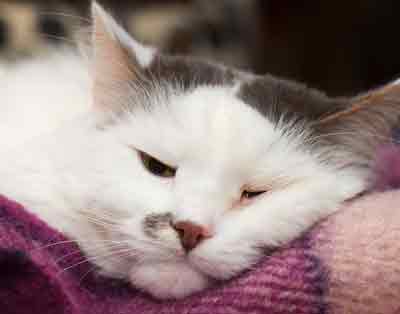IBD: Inflammatory Bowel Disease in Cats

Inflammatory bowel disease (IBD) in cats is a group of digestive tract conditions that result in inflammation in a cat's gastrointestinal tract.
What Causes Feline IBD?
Inflammatory bowel disease is the result of inflammatory cells infiltrating and taking up residence in the wall of a cat's GI tract. There are many causes for this, including:
- GI parasites
- Bacterial or viral infections
- Food allergies
The majority of IBD cases in cats are idiopathic, which means that the initial cause of the problem isn't known.
Scientists are coming to the conclusion that some cases of feline IBD are the result of an autoimmune problem where the body attacks normal bacteria in the GI tract.
What Are the Signs of IBD in Cats?
Inflammatory bowel disease can create differing signs in cats depending on where in the intestinal tract, from the stomach to the colon, the affected tissue is and the severity of the condition.
Cats suffering from IBD may show some or all of the following signs:
- Vomiting
- Intermittent or chronic diarrhea, with or without blood in it
- Weight loss
- Listlessness
- Increased or decreased appetite
Signs of IBD may be constant and severe or mild and intermittent.
Some cats only show signs of IBD when they experience some sort of stress, such as a stay at the kennel.
How Is Feline IBD Diagnosed?
The signs that inflammatory bowel disease produces in cats can also be triggered by a host of other conditions.
Because of this, cats exhibiting signs often need extensive diagnostic work-ups to reach the IBD diagnosis. Some of these tests include:
- Fecal examination
- Blood work
- X-rays
- Abdominal ultrasound
- Food trials
Definitive diagnosis of IBD is made by carefully looking at affected tissue under a microscope. That requires surgical or endoscopic biopsy.
How Is IBD in Cats Treated?
Unfortunately, there is no single treatment that works for all cats suffering from IBD. Your veterinarian may need to try different treatments to see what your cat responds to best. Some cats require only occasional treatment if their signs are mild and very intermittent.
Some of the treatments that might be used include:
- Diet change. Some cats with IBD have it because of a food allergy, so a hypoallergenic diet can help or resolve the signs. Other cats find relief from high-fiber, low-fat diets.
- Corticosteroids. These medications are strong anti-inflammatories, and they also suppress the immune system. They may be given orally or as injections. There can be serious side effects associated with long-term use of steroids, so your veterinarian may monitor for those or choose to use steroids as sparingly as necessary to control your cat's IBD.
- Metronidazole. This medication may help some cats with IBD. It has antibacterial, anti-inflammatory, and anti-parasitic properties.
- Prebiotics and probiotics. Due to the more current research indicating that many cases of feline IBD may have to do with gut flora and the immune system, giving supplements of healthy gut bacteria (probiotics) along with substances that help them flourish (prebiotics) may be helpful.
What Is the Prognosis for Cats with IBD?
Cats with IBD can do quite well and live normal lifespans, but they often have bouts of vomiting or diarrhea periodically. Some cats require continuous treatment while others can be treated intermittently.
You May Also Like These Articles:
Quiz - Are You Making Cat Care Mistakes?
Can Cats Be Vegetarians or Vegans?
Does Your Cat Have Whisker Fatigue?
Should You Get Your Cat a Water Fountain?
Ethoxyquin, Mercury, and PCBs: Is Feeding Fish Safe for Cats?
Giving Your Cat Clean and Fresh Water




